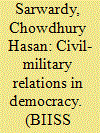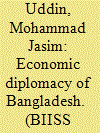|
|
|
Sort Order |
|
|
|
Items / Page
|
|
|
|
|
|
|
| Srl | Item |
| 1 |
ID:
151048


|
|
|
|
|
| Summary/Abstract |
Civil-Military relations are an age-old phenomenon. It involves a multiplicity of relationship between civilian authorities and military institutions of a country. Since the 20th century, civil-military relations have been developing as an important area of study to understand the interactions between the two entities. Many scholars like Samuel P. Huntington and Morris Janowitz have tried to analyse civil-military relations in the context of political approaches and social fabrics of a country. The theoretical developments to understand civil-military relations are also noteworthy. The Post-Modernist Theory as well as the Democratic Peace Theory is relevant to understand civil-military relations in the context of contemporary developments. In modern democratic societies, civil-military relations are considered as a sine qua non for proper functioning of democratic institutions where military establishment remains under the full control of civilian authority and contributes in aid to civilian administration when necessary. However, the experiences of civil-military relations are not same in all the countries. Developing an effective civil-military relation still remains a challenge for many countries. Since independence in 1971, Bangladesh has experienced a lot of challenges to develop an effective framework in this regard. In this backdrop, the present paper is an endeavour to understand civil-military relations in the context of democracy as well as to make an assessment regarding the civil-military relations in Bangladesh. The findings of the paper are that the idea of civil-military relations is still evolving and to maintain a democratic order, a country needs to develop cohesive relations between civilian authority and military administration. Bangladesh has achieved a lot in the civil-military relations, but still faces a number of challenges in this regard. The country needs to address such challenges to ensure effective democratic functioning of the country.
|
|
|
|
|
|
|
|
|
|
|
|
|
|
|
|
| 2 |
ID:
151050


|
|
|
|
|
| Summary/Abstract |
Studies on economic diplomacy of Bangladesh examine foreign policy and external economic aspects of the country. Such studies have not yet focused on Bangladesh’s Official Development Assistance (ODA) centric economic diplomacy. Instead of assessing how much and whether ODA is required for Bangladesh’s development priorities, this paper examines the major issues of ODA-centric economic diplomacy of the country and how they are to be dealt with. The paper thus limits its scopes – what is on offer or what ODA is on supply keeping aside Bangladesh’s development needs. Rather than providing concrete policy measures for various key ministries and divisions, this paper provides some propositions that could be taken by the Government of Bangladesh (GoB) into consideration. Realising dynamism of global assistance, assessing conditionalities of ODA, lessening gap between commitment of aid and its disbursement, emphasising more on Aid for Trade (AfT) and mobilising climate financing are important issues for ODA-centric economic diplomacy of Bangladesh. No sources at multiple levels which are not tied with tough conditions should in general be left aside by the country. Priority needs to be given to countries or organisations which have already provided soft loans or grants, are still willing to do so as well as those which have emerged as new sources of assistance. The GoB requires exercising effective economic diplomacy to respond to these issues.
|
|
|
|
|
|
|
|
|
|
|
|
|
|
|
|
| 3 |
ID:
151049


|
|
|
|
|
| Summary/Abstract |
Bangladesh won two successive international verdicts over its maritime claims with neighbouring Myanmar and India. The verdicts granted Bangladesh 200 nautical miles of Exclusive Economic Zone (EEZ) in the Bay of Bengal (BoB). Its continental shelf now extends up to 354 nautical miles, with sovereign rights on all living and mineral resources. All this added to the country’s panoramic maritime domain, indubitably huge areas. Consequently, for business-related concerns, economic reasons and sustained development, the country’s new maritime space warrant measures for ensuring its destiny. Some vital concerns remain: knowledge on the resources beneath the marine/seabed or at the aquatic level; the country’s ability, skills and technology to access the resources or even its awareness of how to utilise the resources to its advantage; and, finally, the choices or means accessible for its maritime space or establishing its sway in its maritime domain. All such concerns call for rational analysis and reflection. How Bangladesh could countenance and meet the challenges of utilising its maritime spheres towards serving its overriding interests? In dealing with challenges facing the nation and actions required, the paper analyses some selected sectors that are entwined, keeping in view the conceptual-analytical trends in maritime studies. It pleads for futuristic planning and meticulous execution of neatly considered planning choices to ensure the nation a maritime destiny keeping matters of policy relevance in perspectives.
|
|
|
|
|
|
|
|
|
|
|
|
|
|
|
|
| 4 |
ID:
151052


|
|
|
|
|
| Summary/Abstract |
In the traditional concept, state has been central to security. Search for survival, identity and security has been embedded in the state. Security of state has been synonymous with that of the people. In anarchical international system, the states being in a situation of self help, security dilemma strives for more security in order to secure what has been considered as security. This is because the security that a state has always seems to be inadequate. The sources of security threats as well as the provider of security remain with the state. With the emergence of other non-state sources of security threats, the adequacy of states as provider of security has been challenged by critical theories like Copenhagen and other widening schools of thought. The Westphalian preoccupation of international relations with statist approach is overdrawn. Upon the failure of these schools to provide any alternative to state, the state retains it being the largest collective organisation for universal purpose of security.
|
|
|
|
|
|
|
|
|
|
|
|
|
|
|
|
| 5 |
ID:
151051


|
|
|
|
|
| Summary/Abstract |
Theory of change as a research tool is adopted considerably to comprehend the socio-economic changes resulted from development interventions. The main objective is to understand whether, to what extent and in which areas the interventions have brought significant changes. Bangladesh is widely known as a ‘social laboratory’ where thousands of programmes and projects are being implemented to bring about positive economic and social changes. In the present study, ‘theory of change’ has been operationalised for assessing Empowerment of the Poor through Integrated Agriculture (EPIA) programme adopting quantitative method in the implementation area. The empirical findings suggest that the EPIA programme has brought about significant changes among its beneficiaries located at Bauphal upazila in Patuakhali district which is a backward coastal area of Bangladesh. The results reveal that considerably positive changes took place in income and asset building of the beneficiaries in a quite short period of time in a rural coastal area where the problems of multiple natural hazards like cyclone and salinity are recurrent phenomenon. The positive outcomes and lessons can be learnt through further in-depth study in the programme area, scaled up and replicated widely in other backward areas of the country through necessary customisation.
|
|
|
|
|
|
|
|
|
|
|
|
|
|
|
|
|
|
|
|
|